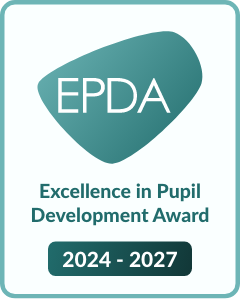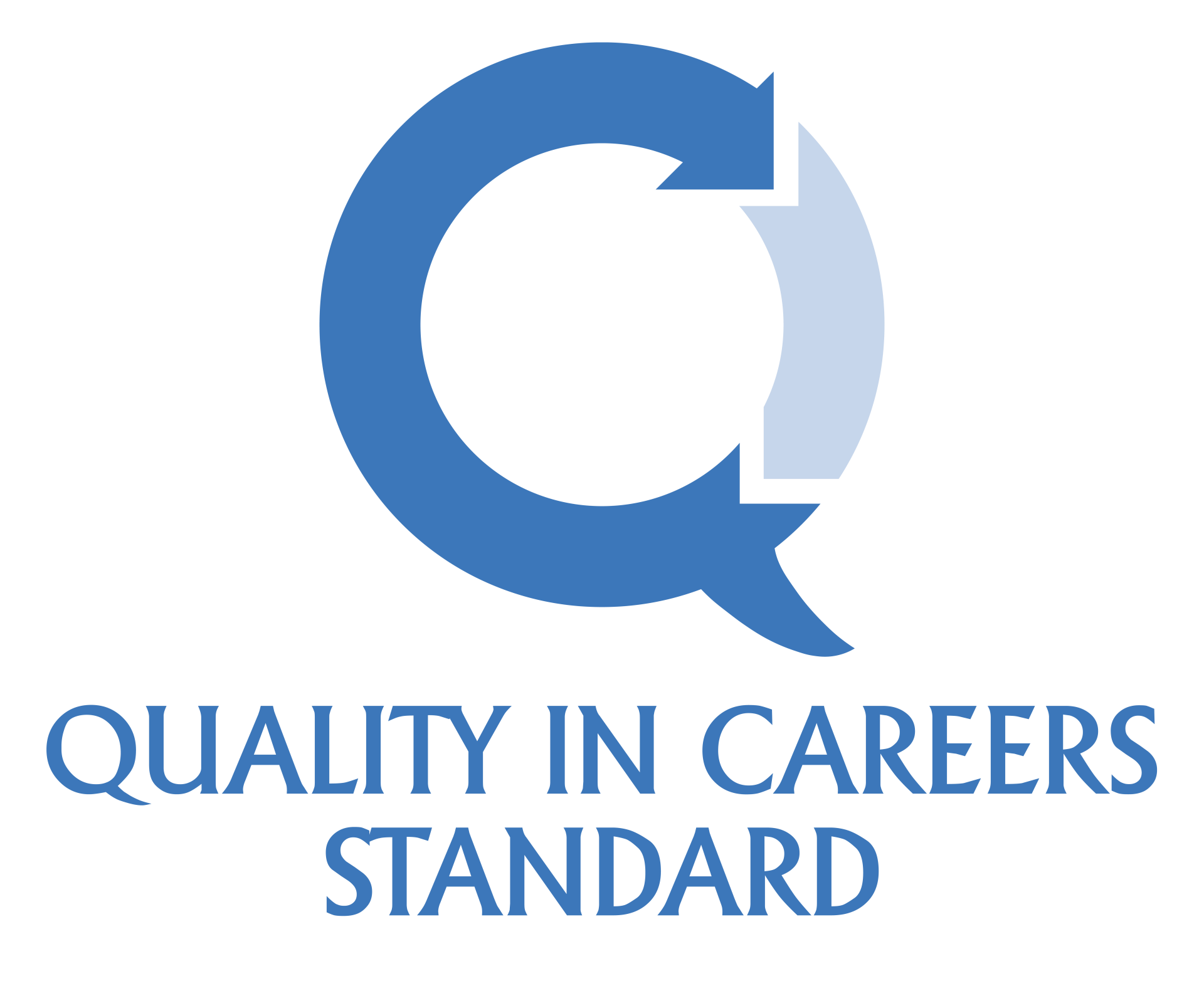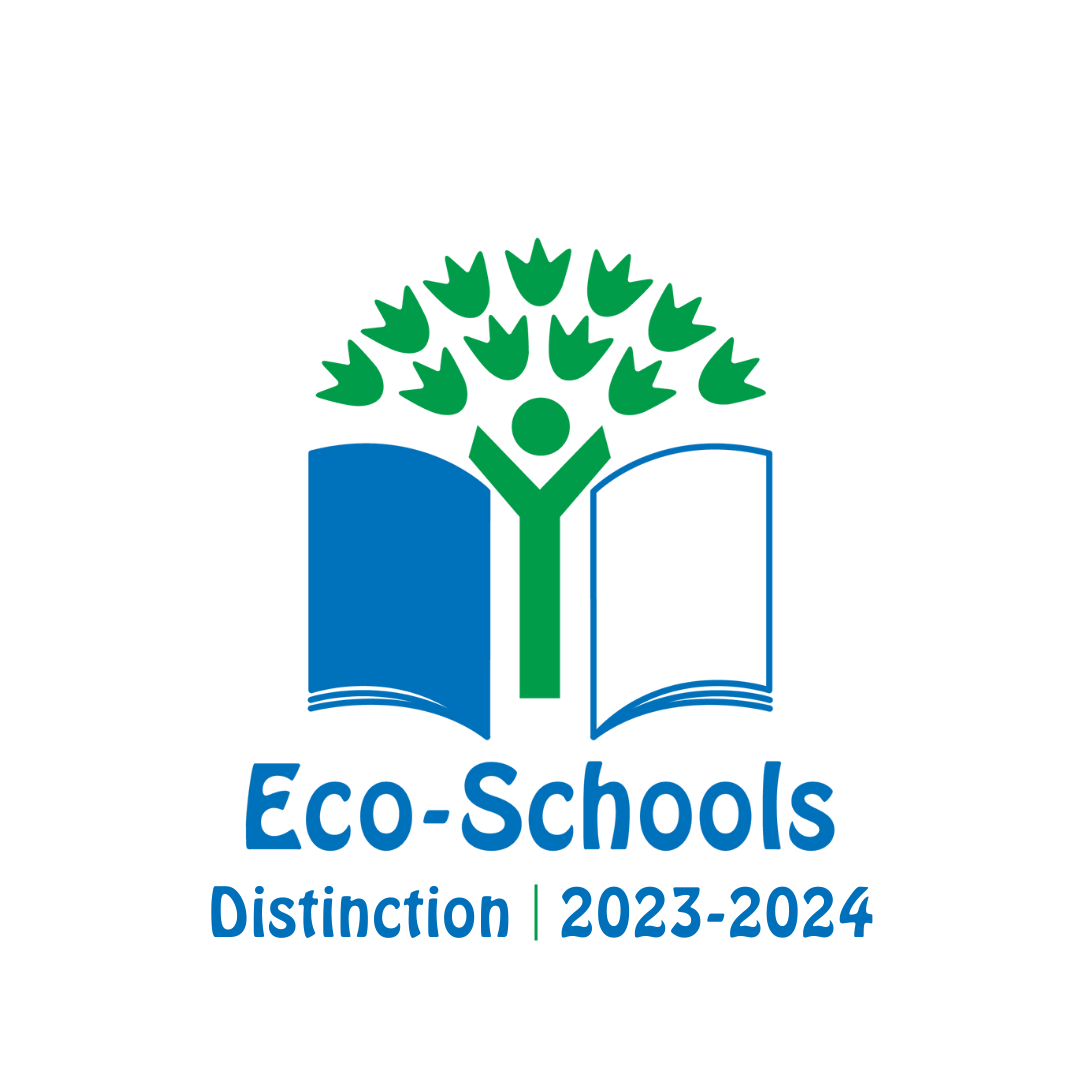SEND
Our SENCO Co-ordinator is Penny Hastings
Our Assistant SENCO for KS3 is Craig Chatburn
You can also email: SEND@lancaster.lwlat.org.uk to contact our SEND Team
Lancaster Academy SEND Strategy on a page
Welcome to the Learning Support Faculty, where a team of well-trained and caring staff provide a range of support for young people at Lancaster who may need additional help, guidance and information so that they can reach their true potential. You can see from the list below that the year-based teams are well placed to offer students in class support so that they can access learning and make good progress.
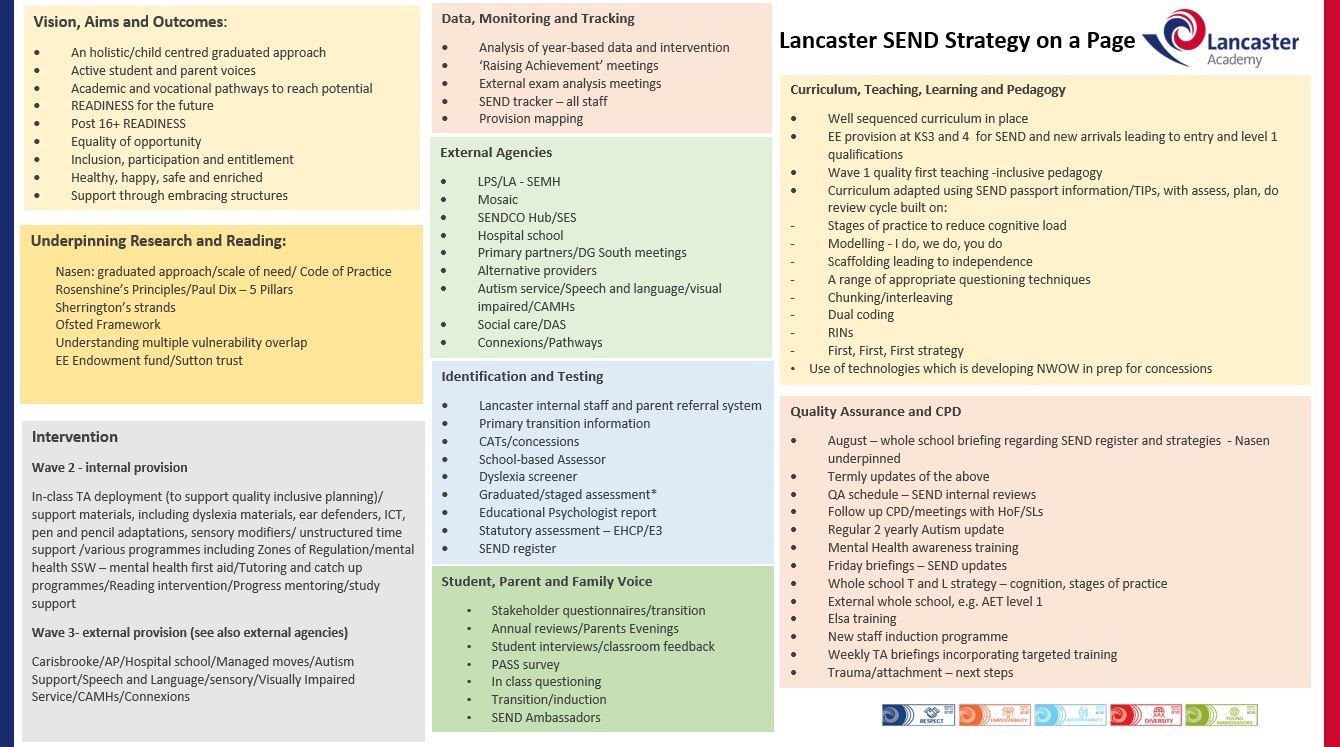
Support
Lancaster Academy Learning Support Team
Welcome to the Learning Support Faculty, where a team of well-trained and caring staff provide a range of support for young people at Lancaster who may need additional help, guidance and information so that they can reach their true potential. You can see from the list below that the year-based teams are well placed to offer students in class support so that they can access learning and make good progress.
The role of the Learning Support department is to provide additional learning support for students across the curriculum. For some students this will be for a short period of time for others it will be more long term.
- Mrs. P. Hastings: SENCO
- Mrs D. Lockington: SEN Administrator
- Ms E. Taylor: Reading/School based Assessments/Literacy Gold
- Miss G. Quinn: Mental Health Mentor/ELSA
- Mrs S. Holland: TA linked to Year 9
- Mrs N. Ali: TA linked to Year 9 Mon/Tues
- Mr O. Guilford: TA linked to Year 9 Wed/Thurs/Fri
- Mrs L. Rees: TA linked to Year 10/Level 3 TA Interventions
- Mrs A. Tomlin: TA linked to Year 10
- Mrs R. Noden: TA linked to Year 10/Expressive Arts
- Miss S. Rayarel: TA linked to Year 11
- Mrs A. Wallis TA linked to Year 11 Tues/Wed
- Mrs L. Warner: TA linked to Year 7
- Mrs A. Musa; TA linked to Year 7
- Mrs M. Aman: TA linked to Year 8
- Miss K. Bland: TA linked to Year 8/Reading
- Miss C. Mahogo: Reading and level 3 TA interventions
- Mrs F. Sheikh: Encompass Form/Reading and level 3 TA interventions
We also have a number of adult support staff who work on a 1 to 1 basis with students, supporting progress in reading, catch up in English and maths or working with small groups in class. There is also an intervention for dyslexia called Literacy Gold.
Designated Specialist Provision (DSP)
Designated Specialist Provision (DSP) The Brook
Exceptional Support for Communication and Interaction Needs at Lancaster Academy
Email: LAN-DSP@lancaster.lwlat.org.uk to contact our Designated Specialist Provision (DSP) Team
Staff:
- Mrs C. Mitchell: Maths Teacher/ DSP Co-ordinator
- Mrs S. Teasdale: HLTA The Brook/Access Arrangements
- Mr K. Sarwar: HLTA The Brook/Access Arrangements
At Lancaster Academy, our vision is clear: to empower every student to be READY to thrive in a dynamic, ever-changing world; we believe in Respect, Employability, Accountability, Diversity and Young Ambassadorship.
We are proud to offer our new Designated Specialist Provision (DSP) for students with Communication and Interaction Needs, where we expertly combine care, creativity, and expertise to ensure every child can shine.
The Brook Newsletter
Why Choose Lancaster’s DSP?
Transformative Core Values
At the heart of our academy are the values of Respect, Employability, Accountability, Diversity and Young Ambassadorship. These qualities underpin everything we do, inspiring our students to embrace personal responsibility, champion diversity and have a strong voice in shaping the future. Guided by the READY values our students become well-rounded individuals, prepared to achieve academically, socially, and emotionally.
Unrivalled Expertise and Specialist Support
Our DSP is staffed by a highly skilled and passionate team dedicated to meeting the unique needs of every child:
- Expert Leadership: Our DSP Lead, a primary education specialist, supported by ELKLAN trained support staff which brings deep experience to guiding our provision.
- Tailored Teaching: Our specialist DSP and SEND teachers, alongside our highly trained teaching assistants, deliver bespoke curriculums in small, focused groups, ensuring every child’s specific needs are addressed.
- Integrated Educational Psychology: With access to both local authority and private educational psychology services, we ensure comprehensive, proactive support for every student.
- Skilled Support Staff: Our DSP teaching assistants, trained in SLCN strategies, work closely with students to promote independence and success.
A Nurturing Environment with Exceptional Facilities
The Brook classrooms, built to foster learning and development in a secure, welcoming space, are at the heart of our school. From morning meet-and-greet sessions designed to encourage communication, to smaller class sizes where individual attention thrives, we provide an environment that nurtures both confidence and academic growth.
Students benefit from access to mainstream facilities for subjects like art, food technology, and PE, whilst The Brook- complete with SENCo offices, support staff, and intervention spaces - serves as a hub for inclusion and care.
We also prioritize social development through lunch clubs and break-time support, ensuring students feel included and valued throughout the day.
A Seamless Partnership with Families
We know that collaboration with parents and carers is the key to unlocking every child’s potential. From the moment your child joins our DSP, we establish open and regular communication:
- Tailored Transitions: Before starting, we gather detailed insights from primary schools, teachers, and parents to craft an individualized plan.
- Dedicated Support: You’ll have access to regular updates, termly meetings, and parent drop-in events to stay connected with your child’s progress.
- Safe and Secure Transport Management: If your child accesses transport to school, our DSP team ensure a smooth and stress-free experience on arrival at school and at the end of the day.
An Enriching Curriculum and Pathway to Mainstream Success
Within The Brook believe in unlocking every child’s potential and empowering them to achieve their personal best. Our bespoke curriculum is designed not only to address individual learning needs but also to serve as a stepping stone into mainstream education wherever possible.
A Stepping Stone to Mainstream
The ultimate goal for students within The Brook is to transition successfully into mainstream classes. Once a child has closed key knowledge gaps, can access the curriculum, and demonstrates the communication and interaction skills necessary to thrive in a mainstream setting, they will begin this transition.
We carefully support this process, tailoring it to each child’s readiness. For those able to make this leap, the journey represents a significant milestone in their development. While some students may continue to benefit from the nurturing environment of The Brook throughout their time at Lancaster, the majority will achieve mainstream integration—an outcome we work towards with pride and dedication.
Laying the Foundations for Success
Our curriculum prioritizes not only academic achievement in core areas like reading, writing, and mathematics but also the social and emotional skills essential for navigating a larger classroom environment. With interventions tailored to individual needs and access to mainstream facilities in subjects such as art, food technology, and PE, our students gain the confidence and competence to thrive. The READY curriculum also prepares students for the world beyond school and The Brook.
By focusing on each child’s unique journey, we ensure that The Brook isn’t just a place of learning—it’s a launchpad for broader success.
Celebrating Success, Championing Inclusion
Inclusion is more than a principle at Lancaster; inclusion is about a deep sense of belonging. Every decision we make is guided by the belief that every child deserves the opportunity to succeed. Alongside access to the full school calendar, The Brook students enjoy exclusive events that celebrate their unique achievements, fostering pride and belonging.
Join Our Journey of Excellence
Lancaster Academy is proud to celebrate neurodiversity and champion positive attitudes toward SEND. With our DSP provision, we’re not just supporting students—we’re shaping compassionate, resilient, and capable global citizens.
At Lancaster, we don’t just believe in meeting needs. We unlock potential, ignite ambitions, and ‘READY’ our students for a bright future.
Join us and discover the difference our expert team can make for your child.
DSP Map
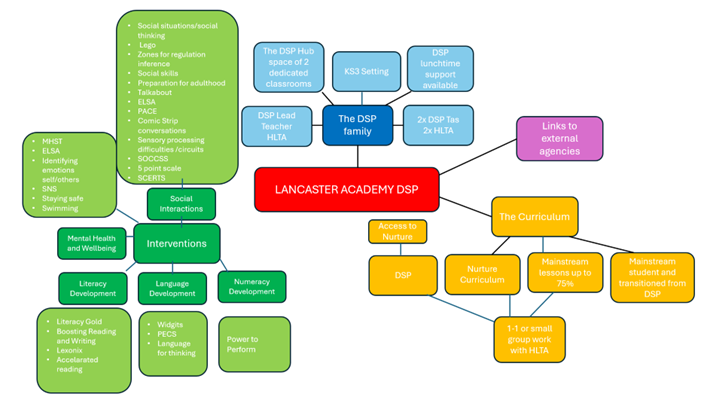
Further Support
- ChatAutism is a text message support service which provides a safe and easy way to send a text message to a healthcare professional and get confidential help and advice.
- Dynamic Support Pathway (DSP) is an all-age early intervention pathway for people with Learning Disabilities, Autism or both. The DSP is for people living in Leicester, Leicestershire and Rutland (LLR).
The Local Offer
- A short animation sharing what the Local offer is:
Family Information | What is the Local Offer? (leicester.gov.uk)
- A link to the Local Offer website:
The SEND Local Area Review took place at the end of April 2018. This was a review of the Local Area (which includes the local health care providers, the local authority and partners including schools and colleges) and focused on three key areas:-
1. How effectively the local area identifies the needs of children and young people with special educational needs and all disabilities;
2. How effectively the local area assesses and meets the needs children with special educational needs and all disabilities; and,
3. What evidence there is of the impact of partnership working on improving the outcomes overall for children and young people with special educational needs and all disabilities.
The review found strengths and 5 key areas of concern identified by Ofsted and CQC (Care Quality Commission): -
1. The lack of strategic planning to improve the outcomes for children and young people who have SEN and/or disabilities.
2. The poor quality of the education, health and care (EHC) plans
3. The assessment of children and young people’s social care needs
4. The lack of joint commissioning of services to support young people’s health needs post-19
5. The disjointed approach to preparation for adulthood.
Following the inspection, a Written Statement of Action was co-created by the LA, Health and partners aiming to address each of the identified areas of concern. The plan was reviewed and accepted by Ofsted as a viable plan.
A SEND Improvement Board was created for the purpose of “owning” this action plan and to make sure all the actions were being completed in time. This Board meets on a bi-monthly basis to review the actions and discuss any other matters relating to SEND.
Ofsted also identified positive areas that the local area does well including: -
1. The early years SEN team works well with other health and care professionals to meet the needs of younger children
2. Inspection evidence indicates that children and young people who have SEN and/or disabilities are kept safe
3. Those parents and carers who have accessed the mediation service (special educational needs and disabilities information, advice and support service – SENDIASS) are very satisfied with the help and support they receive
4. Children and young people have high aspirations of what they want to achieve in life.
5. Leaders have commissioned a project to improve the outcomes of children in school.
For further information on the Local Area Review and the Written Statement of Action, please click here.
The Codes of Procedure 2014
Usually a student’s learning needs can be met by suitable teaching strategies, differentiation of resources, or by being part of an intervention programme. Where a student’s needs are more complex, we will seek further advice from outside agencies, for example the Education Psychologist or Speech and Language Service and where appropriate provide in-class support and/or intensive tuition by a SEN qualified teacher.
We recognise that student needs are best met when parents/carers, school and other professionals work together.
SEND across the Key Stages
KS3
Students’ learning needs should be identified and met as early as possible. To do this we carry out the following:
- liaise with primary schools
- assess basic literacy and numeracy skills on entry
- communicate closely with both parents/carers, students and professional partner agencies.
Once any additional needs are identified, parents are informed and students are provided with individual learning programme which may be classroom based activities, intervention/s or be a mixture of both.
This may include the following:
- Numeracy intervention groups
- Language Groups
- Social Communication Group
- Small groups for additional help with spellings, comprehension, reading, writing etc
- Touch typing classes
- Learning/Movement breaks
- Reading groups
- Nurture Curriculum Withdrawal
- Commando Joe's
- Lexonik
- Literacy Gold
- ELSA
- Progress Mentoring
- ASD all about me
- Precision Teaching
- Dyslexia friendly resources
Students who have received learning support during Key Stage 3 will be automatically assessed to determine whether support is required for GCSE exam access. This could include extra time, a scribe, a reader or use of a laptop computer.
KS4
Students who have not made expected progress at the end of Key Stage 3 will be identified at Key Stage 4 through on-going observation and assessment and given extra support to help achieve their potential where needed. Subject specific TAs in core subjects will be utilised for this.
Additional Information
A child of compulsory school age or a young person has a learning difficulty or disability if he or she:
- Has a significantly greater difficulty in learning than the majority of others of the same age.
- Has a disability which prevents or hinders him or her from making use of facilities of a kind generally provided for others of the same age in mainstream post-16 institutions.
All children and young people are entitled to an education that enables them to make progress so that they:
- Achieve their best
- Become confident individuals living fulfilling lives, and make a successful transition into adulthood, whether into employment, further or higher education or training.
The SEN Code of Practice states that there are four broad areas of SEN give an overview of the range of needs that should be planned for:
1. Communication and Interaction
Children and young people with speech, language and communication needs (SLCN) have difficulty in communication with others. This may be because they have difficulty saying what they want to, understanding what is being said to them or they do not understand or use social rules of communication. The profile for every child with SLCN is different and their needs may change over time. They may have difficulty with one, some or all of the different aspects of speech, language or social communication at different times of their lives.
Children and young people with ASD, including Asperger's Syndrome and Autism, are likely to have particular difficulties with social interaction. They may also experience difficulties with language, communication and imagination, which can impact on how they relate to others.
2. Cognition and Learning
Support for learning difficulties may be required when children and young people learn at a slower pace than their peers, even with appropriate differentiation. Learning difficulties cover a wide range of needs, including moderate learning difficulties (MLD), severe learning difficulties (SLD), where children are likely to need support in all areas of the curriculum and associated difficulties with mobility and communication, through to profound and multiple learning difficulties (pmld), where children are likely to have severe and complex learning difficulties as well as a physical disability or sensory impairment.
Specific learning difficulties (SPLD), affect one or more specific aspects of learning. This encompasses a range of conditions such as dyslexia, dyscalculia and dyspraxia.
3. Social, Emotional and Mental Health Difficulties
Children and young people may experience a wide rane of social and emotional difficulties which manifest themselves in may ways. these may include becoming withdrawn or isolated, as well as displaying challenging, disruptive or disturbing behaviour. These behaviours may reflect underlying mental health difficulties such as anxiety or depression, self-harming, substance misuse, eating disorders such as Attention Deficit Disorder, Attention Deficit Hyperactive Disorder or attachment disorder.
4. Sensory and/or PhysicalNneeds
Some children and young people require special educational provision because they have a disability which prevents or hinders them from making use of the educational facilities generally provided. These difficulties can be age related and may fluctuate over time. Many children and young people with vision impairment (VI), hearing impairment (HI) or a multi-sensory impairment (MSI) will require specialist support and/or equipment to access their learning, or rehabilitation support. Children and young people with an MSI have a combination of vision and hearing difficulties.
For a small number of students whose needs are severe and enduring, the LEA may issue a Statement of SEN. A Statement is the result of a multi-professional assessment and includes Statement objectives used to inform Individual Education Plans and to assess learning.
Lancaster Academy in line with the Equality Act 2010, will not discriminate any student and will take all reasonable steps to provide effective educational provision.






 ↑
↑

